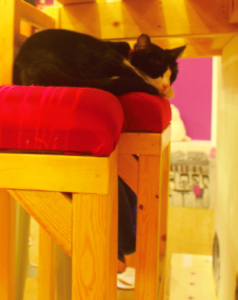Cat cafés have been around in other countries for several years and are beginning to burgeon in the Philippines.
Text and Photos by Carlo Suerte Felipe, with additional reporting by Celina Cheng
This year alone, four have opened in Metro Manila (mostly in Quezon City, with one in Pasay City), with more in the works.
Cat Café Manila opened its doors to the public in April of this year, and is located along Maginhawa Street, best known for its numerous food establishments. The establishment has cats not as owners or waiters, but as an attraction for customers who, it is hoped, will appreciate the felines better and learn more about the importance of adoption, spaying and neutering, and responsible pet ownership.
 The place is small and can only accommodate about 15 persons at a time, a precaution so that the cats will not be stressed out or tired. Visitors who stay to play and interact with the 14 cats who call Cat Café Manila their home can order pastries and drinks.
The place is small and can only accommodate about 15 persons at a time, a precaution so that the cats will not be stressed out or tired. Visitors who stay to play and interact with the 14 cats who call Cat Café Manila their home can order pastries and drinks.
Cat Café Manila is owned by a group of individuals who share a similar passion for cats. Anne Calvo, of the owners, said the inspiration for the cafe came from Fifi, the cat she rescued about two years ago. She said she didn’t had any interest in cats until she got Fifi.
“Some of my friends gave me the idea of putting up a cat cafe here. Then, they told me to visit one during my trip to Japan last year so that I could have an idea,” Anne recalls.
The end result is a cat cafe with a cause. Cat Café Manila recognized the fact that many rescued cats stay in shelters for a long time. To support the advocacy of animal welfare, they got in touch with existing organizations for possible partnerships.
CARA (Compassion and Responsibility for Animals) Welfare Philippines was the first to respond and agreed to place some of its rescued cats in the cafe. With the partnership, Cat Café Manila acts as an annex of CARA’s cat shelter.
“Part of the business setup is having an advocacy or ‘cat-vocacy.’ We want to help spread awareness among our customers about spaying and neutering pet cats,” Anne says.
The good thing about having the rescued cats make the café their home is that the cafe owners don’t have to purchase purebred cats or breed PusPins (Pusang Pinoy). It comes as no surprise that all the cats in the cafe are up for adoption. Co-owner Dennis Ty says that those who want to adopt a cat can approach one of the staff.

“Those who wish to adopt a cat can fill out a form which will be submitted to CARA. And just like adopting a child, they will be assessed by CARA,” Dennis said. Early in July, Shelly, the cafe’s all-white cat, was the first to be adopted. She is now owned by Bea Cruz.
The cats are named according to their background stories and personalities. For example, Shelly was named thus because she was found at a Shell gas station. Basu and his brother Rahan were rescued from a garbage bin—called a “basurahan” in Tagalog.
There’s also Peggy, whose name came from the way her severely injured foot looked when she was first rescued by CARA. With the bone completely exposed, it looked like a peg leg; it eventually had to be amputated.
Customers of Cat Café Manila are assured that the cats have a clean bill of health and are vaccinated. A vet checks the cats every two to three weeks. And while the cats stay at the cafe 24 hours a day, they are monitored through the installed CCTV cameras.
Even if a customer doesn’t adopt a cat, a visit to the Cat Cafe Manila also means supporting the cats. A person is charged R200 for a one-hour stay with the cats. Half of it goes to the cats and the remaining can be consumed on food and drinks.
Cat Café Manila is an excellent example of how an advocacy can be incorporated into a business model, and Animal Scene looks forward to seeing more of the same, both for cats and other creatures.
This appeared in Animal Scene’s August 2015 issue.






